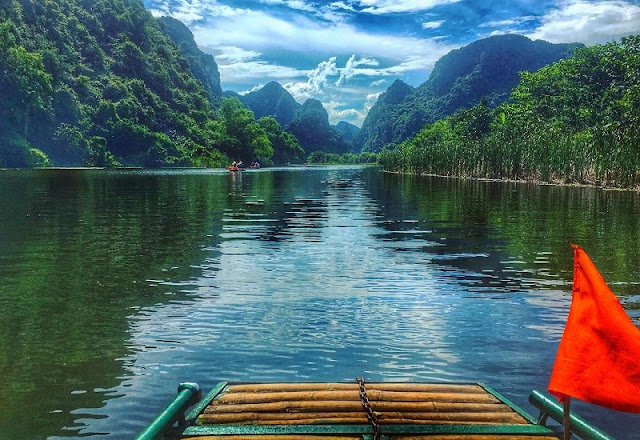The new boat tour at the tourism hub of Trang An complex in the northern province of Ninh Binh is adding more prestige to the UNESCO-recognised World Heritage Site while at the same time strengthening the province’s tourism brand.
- The tourist destination in Vietnam you must definitely go
- The beauty of Ninh Binh in the lens of Japanese overseas student
The new waterway tour, the third of its kind, offers tourists a scenic boat trip of three hours through the Trinh and Quy Minh temples and caves of May, Dia Linh, Van and Dai. During the tour, visitors also have chance to stop at the Vu Lam Palace and Kong film shooting site then return to the departure point.
With the new waterway route tour, which opened in February with a ticket price of VND200,000 (US$9) per person, Trang An now has three waterway tours and one road route to serve visitors.
The tours offer the chance to visit up to 11 caves, temples and pagodas including the Trinh Temple and picturesque mountainscapes. The river water is clear enough to view aquatic plants living on the river bed. The nature is pristine with forested mountains and green valleys of reeds and bushes.
The new route is not a difficult trek but includes walks to the Tran Temple, the Vu Lam worshipping palace of the Tran dynasty and to Kong Village, a recently built model aboriginal community with many simple bamboo huts and friendly local villagers – just like the village you see in the latest Kong film: Kong: Skull Island.
 |
| Photo by Trangk |
Nguyen Van Duong, a freelance tour guide specialising in Ninh Binh boat tours, told Viet Nam News that like many other tours in the province, including those through Tam Coc and Bich Dong Complex, the new boat tour in Trang An was obviously attracting visitors to the area.
Duong said along with stops at spiritual and historical vestiges such as the Trinh and Quy Minh temples, the new stop at the Kong film studio on the tour was attracting foreign and international visitors seeking to satisfy their curiosity and admire the natural beauty of the complex.
The Trinh Temple has a history of more than 1,000 years while the Quy Minh Temple has been recently restored.
Those interested in history will be attracted to the Vu Lam military base, built by the first emperors of the Tran Dynasty (1225-1400) after they defeated Mongol invaders. Caves, especially May Cave with its different stalactites, and Dia Linh Cave, the longest in Trang An at 2km and featuring a pristine beauty, provide adventure trips for those interested in exploration.
Director of the Ninh Binh Province Tourism Department Bui Thanh Dong told Dan Tri online newspaper that this year the province expected to welcome 7.2 million tourists and gross a turnover of VND2,700 billion (US$117 million).
The new waterway tour is the first step in the province’s plan to increase the number of tourists, particularly those who wanted to follow adventurous tours, Dong said. Nguyen Thanh Trang, a business representative from the agency C-Vietnam Travel, said positive signs had been recorded in tourism development since Ninh Binh has attracted more interest thanks to local historical and cultural vestiges as well as well preserved natural beauty and eco-systems.
 |
| Photo by Annietphan |
From Hanoi to Ninh Binh about 90 km, It's known as “Ha Long Bay on Land”, given its limestone mountains rising out of paddy fields. The most famous local attraction is the Trang An Landscape Complex, which has been expanded over recent years and gained popularity for its green fields, mountains, caves and forests. The province has been listed as one of the 50 best spots to visit in 2018 by US travel site Insider.
Together with other famous sites in the province such as Tam Coc Grottos and Van Long Lagoon, the Trang An Landscape Complex was also used as a location for the movie Kong: Skull Island, one of the biggest Hollywood blockbusters of 2017.
The locations opened to tourists last April. Ninh Binh welcomed over 7 million visitors last year, up nearly 10 per cent against 2016, of which international visitors were nearly 860,000. The Trang An tourism complex has a total of 40 tourism spots of historical, cultural, art and natural vestiges including 20 recognised as national heritages.
In 2014, it was officially recognised as a mixed cultural and natural heritage by UNESCO thanks to its outstandingly natural & cultural values. In UNESCO’s words, "Trang An is a resplendent complex of limestone karst peaks which are permeated with valleys, including submerged ones, and surrounded by steep, almost vertical cliffs", nestling on the southern shore of the Red River Delta. Archaeological traces of human activity dating back thousands of years have been found within the complex.
The Trang An Complex boasts several nationally recognised sites like the Trang An ecotourism site and Hoa Lu, Viet Nam’s capital in the 10th and 11th centuries. The area also has many temples, pagodas, paddy fields, villages and other sacred sites. It is home to about 500 flora species, 73 species of birds and 41 species of other animals and has a diverse ecosystem.
